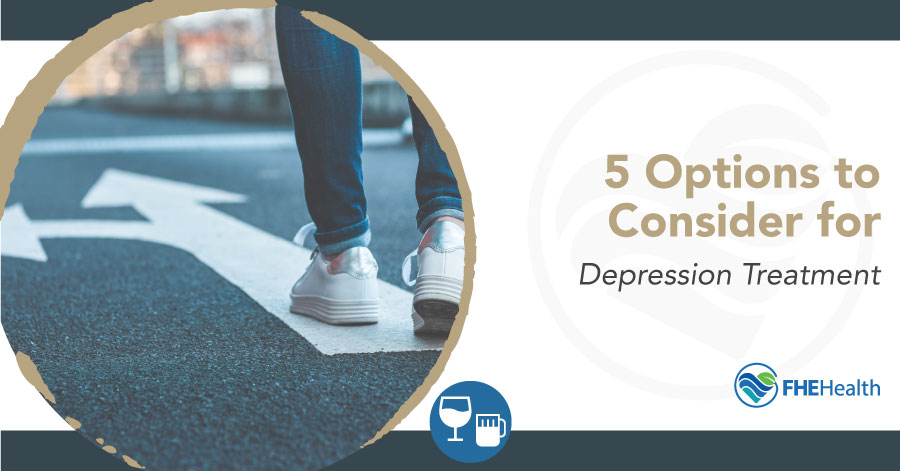
Depression can be a paralyzing mental health condition that saps your energy and enthusiasm for life. However, contrary to popular belief, the condition is not at all rare and affects more than 10% of women and 5% of men at some point in their lives. A number of depression treatment options are available to address the condition, and some interventions have statistically higher success rates.
Depression Treatment Options
Learning about the following five types of treatment for depression may help you find the best option for your needs.
Lifestyle Changes
Some common treatments for depression, such as lifestyle changes, are easy to implement. Before trying expensive medications or other medical solutions, try making the following simple changes to your lifestyle and habits.
- Diet and exercise: Research has shown that regular physical exercise can help alleviate the symptoms of depression. A plant-based diet free of excess fats and sugars can also help.
- Social relationships: Most people require a steady stream of human contact to maintain a positive outlook. Even something as simple as a short phone conversation can make a difference.
- Stress management: When work or family duties become too much, stress can take over and worsen symptoms of depression. Taking a break or meditating can help relieve some pressure.
- Sleep hygiene: Getting regular sleep is the foundation of good mental health. Make sure to go to sleep at the same time every night, and avoid eating two hours before bed.
- Substance use: Those who misuse substances are at increased risk of depression. If avoiding substance use isn’t possible, seeking addiction treatment is the best way forward.
The key to making lasting lifestyle changes is choosing realistic goals and pursuing them consistently. Often, managing your health, social or sleep goals is easier if you keep track of them in a notebook or through a dedicated app. Working with a therapist is another good way to stay on top of long-term goals.
Depression and Therapy
If lifestyle changes aren’t enough, the next step is to talk to a licensed therapist. If you’re suffering from clinical depression, psychotherapy can help alleviate symptoms or make them easier to cope with. Therapy also offers a way for you to find other treatment options and better understand how they can fit into your life.
When pursuing therapy treatment for depression, it’s important to understand the types of professionals who offer these services. Psychiatrists and psychologists both offer talk therapy. Psychiatrists are able to prescribe medications, whereas, in most cases, psychologists can’t write prescriptions. Licensed social workers, counselors and therapists also offer talk therapy.
There are several types of therapy that are used to help treat depression in specific ways. Interpersonal therapy is the most common. Regular conversation with a therapist helps clients understand how they relate to others and make positive changes in their lives.
Cognitive behavioral therapy is another approach that helps patients correct false self-beliefs that can cause negative behaviors and moods. Studies show CBT is an effective treatment for depression when used either alone or in conjunction with antidepressant medications. It’s also shown to be a good solution for many age groups, including teenagers.
Medication
All medications for depression are prescription-based and can be prescribed by a psychiatrist. If you’re working with another type of mental health professional and are interested in trying an antidepressant medication, you can ask for a referral to a psychiatrist.
After a comprehensive interview to determine your needs, your psychiatrist can choose from a wide range of antidepressant treatments. Some of the most common are SSRIs, which include name-brand drugs such as Prozac and Zoloft. These help make feel-good chemicals like serotonin more available in the brain, improving mood.
No matter what type of medication you take, it’s essential to understand the potential side effects that come with them. SSRIs, for example, cause some users to experience an upset stomach. Drowsiness, insomnia and decreased sexual desire are also commonly reported. Your psychiatrist will discuss these or other potential side effects before writing a prescription.
Inpatient Treatment
When symptoms of depression or other psychological disorders become overwhelming, inpatient care may be a good option to consider. The major benefit of inpatient care is that it removes many of life’s distractions, allowing you to spend more time focusing on your treatment and recovery.
This form of treatment for depression takes time, commitment and money. You can expect a month-long stay at an inpatient care facility to cost several thousand dollars. More high-end facilities can cost tens of thousands per month, depending on a variety of factors such as location, size and staffing. However, many facilities offer sliding-scale options that can make them more affordable.
Another advantage is that in-patient facilities may offer depression treatment options that aren’t easily accessed elsewhere. One such treatment for extreme depression is electroconvulsive therapy. This therapy uses a small electric current to safely trigger a minor seizure in the brain. While this may sound a little intimidating, it’s a time-tested therapeutic procedure with strict guidelines and a strong track record of success.
Outpatient Treatment
Outpatient treatment offers many of the advantages of inpatient therapy, but it’s often a better option for those working with a smaller budget. Rather than several thousand dollars, these programs may only cost a few hundred dollars per month while still offering access to regular treatment sessions. The main differences are that patients don’t stay at a facility 24/7 and accommodations and meals aren’t provided.
Because outpatient treatment can’t eliminate all of life’s distractions the way inpatient care does, these programs typically emphasize family involvement as part of the therapy process. This will help ensure you have a strong support structure as you work to alleviate your symptoms.
Are you in need of professional guidance to help you overcome depression or another mental illness? Contact one of FHE Health’s compassionate counselors at (833) 596-3502. Our team is trained to work with you on a one-on-one basis to help you achieve a complete recovery.






